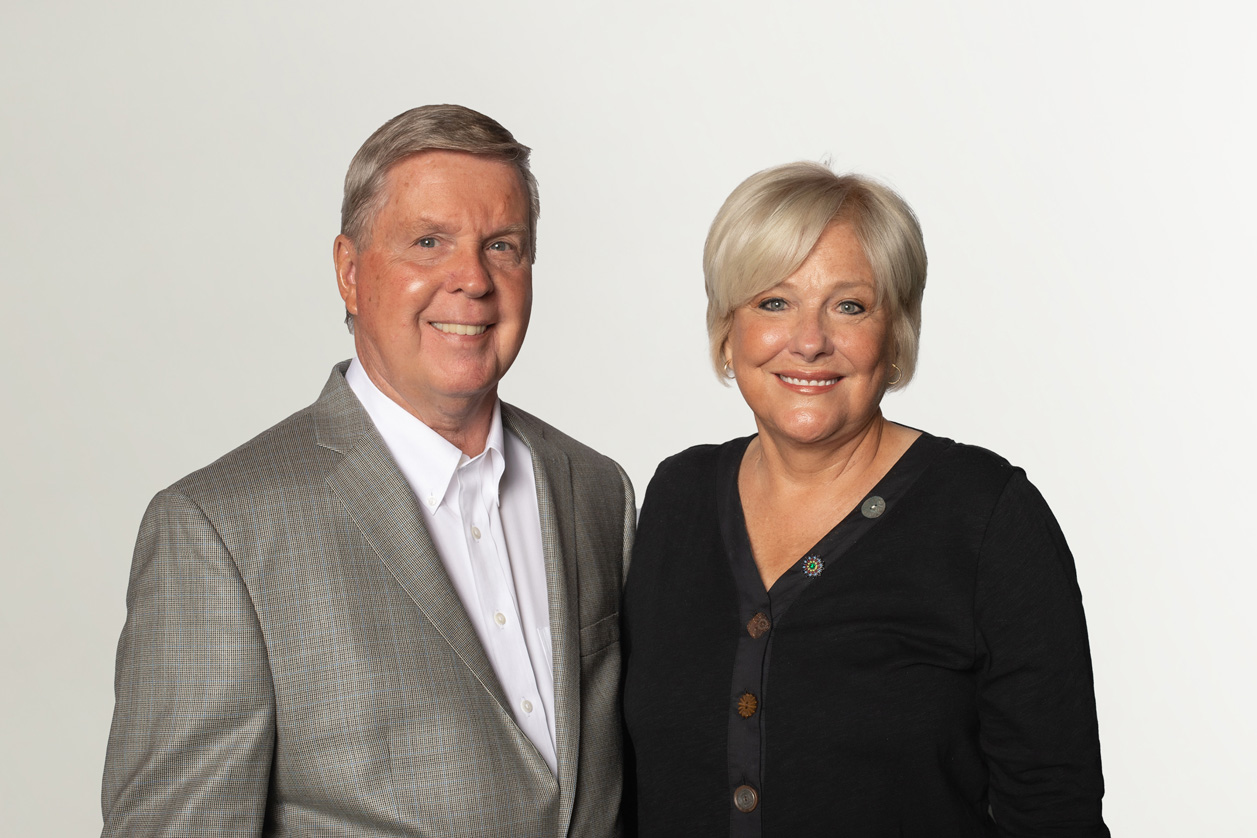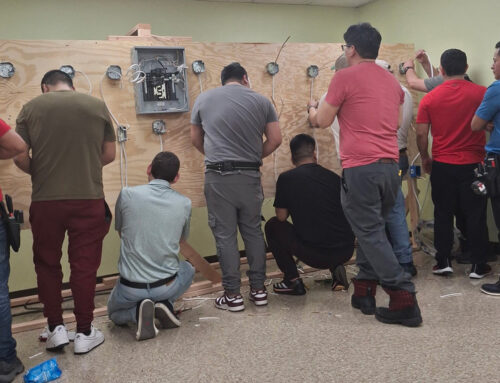
Seasons of Refreshing:
an interview with Pastor Jim Cymbala
by Warren L. Maye
Since their humble beginnings in 1971, Pastor Jim and Carol Cymbala have served as spiritual leaders of the Brooklyn Tabernacle, which is today an historic 3,300–seat, non–denominational megachurch in Brooklyn, N.Y. It is world renowned for its melodic Brooklyn Tabernacle Choir, which has received six Grammy Awards so far. Carol Cymbala is director of the multi–ethnic, multiracial chorale. Despite her lack of formal musical training, she has nonetheless written many of its signature songs.
The Cymbalas are also longtime friends of The Salvation Army, having ministered at various events on several significant occasions during the past 18 years.
“It is my privilege,” said Pastor Jim Cymbala. “In fact, we’re looking forward to June 9th, when the Brooklyn Tabernacle Singers and Carol and I will be in Hershey, Pa., with you all.” He alluded to the annual commencement, ordination, and commissioning event of new Salvation Army officers (pastors).
In an exclusive interview, Pastor Cymbala shares his hopes and prayers for the Church as it faces a myriad of challenges in today’s world.
Can you tell us about the message you will deliver to The Salvation Army?
JC: As of this moment, I don’t know. I stopped using notes about 18 years ago. But it’ll be about Christ, and it’ll be a word of encouragement to all the Salvationists and everyone else who are serving Christ. I want to inspire them with more of the anointing. I want to proclaim Christ to those who don’t know how simple it is to become a Christian.
I would imagine your message will stem from your long history with The Salvation Army.
JC: I’m currently preparing to speak at a pastors’ conference. I didn’t go to seminary or Bible school, so they’ve asked me to list the 25 books that have most affected my life. As I was walking through my office library, I saw the five–volume series on the sermons of Catherine Booth. And then I saw a book on Bramwell Booth, and then books on the General and all those names from your illustrious history that so impacted my spiritual formation.
I understand there’s a mural in your church that shows Salvationists in ministry.
JC: There’s an area of the second–floor lobby of the main building as you go into the theater, built in 1917. There were some architects, painters, and decorators from an elite restoration company that specializes in doing historical state capitals and historical theaters. When they restored our building, I asked, “Can you reproduce this photo on the wall?” It pictured the Army’s early days, showing the General coming to America to plant the flag in the 1900s. The scene was a street meeting in Manhattan. That picture always moved me. I never wore the uniform, but I have a spiritual connection to the Army.
Yes, I understand. From your perspective, what would you say are the greatest spiritual challenges that we face these days?
JC: I’ll give you the challenges in a second, but the answer to them all is—the Spirit, and the blood and fire of the early Salvation Army. I think the Christian Church, and in too many places, has grown apathetic, has been invaded by the culture, so that instead of evangelizing the culture, the culture has evangelized us. The Church is shrinking. You can’t use faith talk to get away from that fact. Fewer people are going to church now than ever before in the history of our nation. Denominational leaders lament to me that they are forced to close buildings.
What’s worse is the discouragement among the pastors. As many as 64 percent say they would leave the ministry next week if they could get a job that would benefit their family. As many as 90 percent of their wives want to get out because of the attacks they suffer through social media.
The murder of George Floyd has brought out the fact that, still, in many denominations and places, the doors are not open to everyone. They are targeting groups, targeting races, targeting ages. Corporate America is invading the Church. Reaching everyone Christ died for, as did the General with his wife, has been replaced with marketing campaigns because they draw other people from those targeted groups.
We’re confronting that now and a lot of other things, such as not preaching from the word of God as much as we should; just looking for attendance spikes rather than for conversions. We need blood and fire. We need to preach the message of the Cross.
We need the fire of the Holy Spirit so we’re not relying on technical ability and “doing church with excellence” and all those superficial things. We need to get back to making the main thing, the main thing. If General Booth was alive today, I would give anything to hear his read on the situation because I think it would be along the lines of what I’m saying.
It sounds like this goes even deeper than the aftermath of the pandemic.
JC: The pandemic has revealed the soft underbelly of the Church. I saw it when I was stuck for 16 months in Florida. I went down there in March 2020 with Carol for a five–day rest and we ended up being there 16 months, Warren! I met Army people, I met pastors of every denomination, and heard what was going on in their churches.
I found that most of the people there are more politically oriented than they are spiritually related. In other words, they don’t see themselves as Christians first, as members of the body of Christ. No, they’re Republican right–wing, Fox News first or left–wing CNN first. They’re “woke,” “not woke” or “too woke.” And if you disagree with them and even go to their church and you’re a Christian, they will still eat you for lunch on social media, rather than say, “wait a minute, that’s my brother or sister in Christ.”
So, I think there’s a pruning going on. Since the pandemic, attendance is down in all churches, because a lot of people didn’t have their roots very deep. They said “adios” to going to church every Sunday.
So, when you think about the future, I kind of look at it this way; the Lord hasn’t changed. Revelation Chapter 3 says to the church at Laodicea, “Here I am! I stand at the door and knock. If anyone hears my voice and opens the door, I will come in and eat with that person, and they with me.”
But that letter ends without us knowing whether they opened the door. So, the question is, what will we do? If you draw near to God, He’ll draw near to you. If you don’t draw near to God, well, what promise can you stand on?
If you preach the Gospel, it has power. If you don’t, you won’t see converts. You know, pseudo prophetic mysticism is not something I really like to get into. I’d rather just say “today is the day of salvation. What can we do today to accomplish God’s work?”
But today, accomplishing God’s work is not what it used to be. You and I know that. So, perhaps we are living in a lukewarm time. Oh, how we need the fire that the Booths preached about!
The Army covers urban, suburban, and rural communities. Is there a common denominator with respect to these geographical areas or should we minister to each one differently?
JC: I think there are some differences that must be made. I get that. But the main thing is, if the doors aren’t open to everyone, and there is no spirit of love, you’ll have a problem no matter what area you are in—the farmland of Wisconsin or downtown Brooklyn.
Secondly, you must pray for a demonstration of God’s spirit in the meeting, through the preaching or the worship, so that people leave and say, as in 1 Corinthians 14, “… as the secrets of their hearts are laid bare. So, they will fall down and worship God, exclaiming, ‘God is really among you!’”
That aim that your organization started with is really the solution for today. General Booth, his wife, and the Salvationists went into the East End of London to talk to prostitutes and drunkards. The Army just went the other way of those sophisticated churches and said, “Everyone is important.”
Secondly, they taught that, without having that fire when you preach, you’re going to put people to sleep. It’s not drama and emotionalism, but it is God, the Holy Spirit. That’s how the Army has helped me so much when ministry was so depressing that I didn’t want to go to church myself.
When I read the Army’s history, I see how God is immutable. He can’t change. But if we change, He’s outside the door. And He loves the Army, and He loves our Church, and He loves all Christians.
It sounds like the solution to today’s problems is already out there and we must revive it.
JC: The General and his wife left a message for the Church, which they saw as falling into the formalism that Wesley fought against in the Anglican church. The beat goes on. But what we need are seasons of refreshing in the presence of the Lord. That might be a good sermon for when I’m there in Pennsylvania—Acts 3:19, “Seasons of Refreshing!”
Read more from the latest issue of SAconnects.




